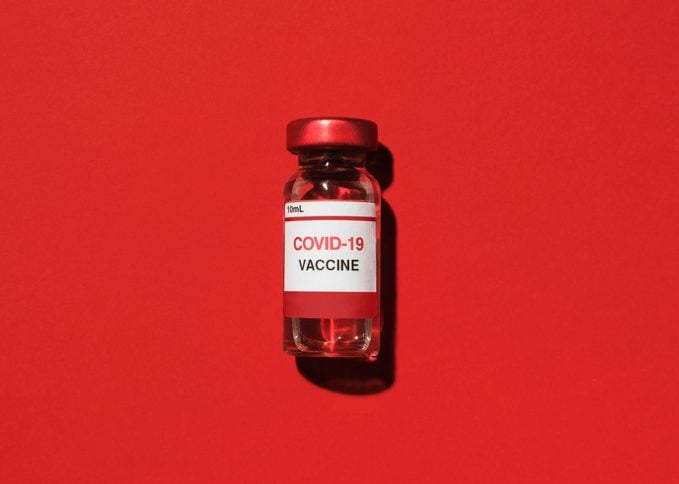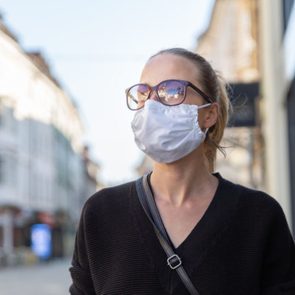The New Covid-19 Vaccine Is Here: This Is What Doctors Need You to Know
Updated: Apr. 12, 2021
Is the vaccine safe? How long does the protection last? When will you be able to get it? Here are expert answers to these questions and more.
Approving the vaccine
The moment we’ve been waiting for is here: The approval of the first Covid-19 vaccine—this one from Pfizer—with several more vaccines coming close behind. It will take months before everyone has a chance to be immunized but the ultimate goal is that enough people will sign up to achieve herd immunity.
“That’s when the virus can’t be transmitted easily among people,” says Katherine Baumgarten, MD, medical director of infection control and prevention at Ochsner Health in New Orleans, which participated in the Pfizer trial. And that, hopefully, will mean next Thanksgiving and Christmas will be very different from this year.
Here’s what you need to know about the vaccines that will hopefully change the world.
Who will get the vaccine first?
There won’t be enough doses to inoculate everybody at once so certain groups will get priority.
The Advisory Committee on Immunization Practices (ACIP) to the Centers for Disease Control and Prevention (CDC) recommends that the first shots go to health care workers and people living in long-term care facilities who are both at very high risk of contracting Covid-19. Individual states, though, will have the final say, says H. Dirk Sostman, MD, president of the Houston Methodist Academic Institute.
Ochsner Health, which may get a shipment of vaccines as early as this weekend, is starting with the highest of the high risk, meaning, those “who are taking care of Covid-19 patients day in and day out,” says Dr. Baumgarten. That includes staff who clean patient rooms.
Next up are the health care workers who are at moderate risk of exposure, then those with a low risk of being exposed. Houston Methodist is following a similar protocol, says Dr. Sostman.
Who gets the vaccine next?
As more vaccines become available, older people and people with underlying health conditions will get priority. Eventually, the plan is to be able to vaccinate everyone with younger, healthier people bringing up the rear. The Food and Drug Administration has approved the vaccine for people 16 years and older.
According to the CDC, the vaccine may not be available for young children until there are more studies. The Pfizer trial did include kids aged 12 to 15, but they made up only a small number (266) out of a total of more than 40,000 participants. Children’s immune systems are different from those of adults so the vaccine needs more studies in younger age groups, says Connecticut Children’s Medical Center. (Here’s who should wait or skip the Covid-19 vaccine.)

When will I be able to get the vaccine?
If you’re not in one of the groups mentioned above, it could be a few months or more. Exactly how long people who are at lower risk will have to wait is unclear. “If all goes well, I think that the vaccine will return us to something close to the old normal by the end of the summer or the beginning of the summer,” says Dr. Sostman. That would mean most people will have been vaccinated by the summer.
(Update: President Joe Biden has directed all states to open vaccine access to anyone 16 or older by April 19, 2021.)
Initial shipments of the Pfizer vaccine will likely go to large medical centers in bigger urban settings, says Dr. Sostman. That’s largely because the vaccine needs to be transported and refrigerated at extremely low temperatures and smaller settings are less likely to be able to do this.
The CDC has more information on what specific states are planning. Two other vaccines from Moderna and Johnson & Johnson also have emergency use authorization from the FDA.
Where will I be able to get a vaccine?
Distribution of the vaccine is being left up to individual states, but eventually one or more of the vaccines will be available at neighborhood retailers like CVS and Walgreens in addition to hospitals and clinics. (Here’s more on how to get the Covid-19 vaccine.)
Should I expect side effects?
You should be prepared for side effects, though you may not have any.
Most side effects reported in the trials were mild, including a sore arm. According to a recent New England Journal of Medicine study, mild and moderate side effects were more common, with 59 percent of people reporting some fatigue and 52 percent reporting headaches after the second dose. Only 2 percent experienced severe headaches and 3.8 percent had severe fatigue.
If you do happen to have these or other flu-like symptoms, take it as a good sign. “You’ll know your body is producing immunity,” says Dr. Baumgarten. The effects will go away in 24 to 48 hours or sooner and a pain reliever may help. And, she adds, you’re more likely to have no side effects.
(Learn why woman may report more Covid-19 vaccine side effects than men.)
What about possible allergic reactions?
Two participants who received the Pfizer vaccine in the U.K. had serious allergic reactions that required treatment with an Epipen. Both people had a history of severe allergic reactions. Bear in mind that allergic reactions to vaccines as well as medications, foods, and other substances are always a potential risk. More updated information shows anaphylaxis is rare.
British authorities are recommending that people who’ve had allergic reactions in the past not get the vaccine for now. “In the clinical trial data, there’s no evidence that the vaccines cause more allergies than just a placebo, but given this event, anybody with severe allergies should wait,” says Dr. Sostman.
FDA documents show that trial participants have been followed for a median of two months after the second dose.
How much will it cost?
According to the CDC, any vaccine purchased with U.S. taxpayer dollars will be free, but the provider may charge an “administration fee.” That should be covered by insurance.
“Under the CARES Act, with few exceptions, there will be $0 member cost-share for the vaccine and its administration during the national public health emergency regardless of whether members get the vaccine from an in-network or out-of-network provider,” says David Pryor, MD, medical director of Anthem health plans (Blue Cross Blue Shield). Walgreens will not be charging for the vaccine.
How many doses will I need?
The Pfizer vaccine requires two shots 21 days apart in order to get full protection. Your immune system will be fully ramped up seven to 14 days after the second jab.
“You want to get that second vaccine,” says Dr. Baumgarten. “That’s how we know that it works from the trials.”
The Moderna vaccine also requires two shots, as do most of the other shots under development, says the CDC. The Johnson & Johnson vaccine only requires one shot or dose. (Find out what it’s like to participate in a Covid-19 vaccine trial.)
Should I get the vaccine if I’ve had Covid-19, or think I’ve had it?
“We’re recommending that people who’ve had Covid-19 should get the vaccine,” says Dr. Sostman. “There’s no evidence that it’s harmful in any way.” Right now, experts aren’t sure how long people are immune to SARS-CoV-2, the virus that causes Covid-19, after being infected.
You might want to think about the timing of a vaccine, though. “The CDC has said if you’ve recently had Covid-19, you may want to let someone who hasn’t had Covid-19 have that vaccine [first],” says Dr. Baumgarten. (Here’s more on whether or not to get the vaccine after having Covid-19.)
Most guidelines recommend waiting 90 days or so after recovery to get the vaccine, but it’s not a hard and fast rule.
How long will my immunity last?
No one knows how long you’re immune after being sick or how long a vaccine will last. There have been reports of people being infected with Covid-19 more than once (reinfection).
The vaccines have been effective as long as the trials have gone on, says Dr. Baumgarten, adding that companies are committed to following vaccine recipients for at least two years. “It looks like a pretty robust immune response,” she says (though there are still a few ways you can get Covid-19 after being vaccinated.)
Will I still have to wear a mask and social distance?
Yes, and wash your hands. Though all approved vaccines are safe and effective, there are still some unknowns.
“We don’t know if there could be transmission despite the vaccine,” says Dr. Baumgarten. In other words, it’s not clear if the vaccine just prevents symptoms, in which case you could still pass it on even after being inoculated (although it’s likely that the vaccine also blocks the virus).
“Those studies will be coming out,” she adds. “Until we have that exact information, we have to be doing all the things like wearing masks, social distancing, and not hanging out in large groups.” Next, find out if wearing two Covid-19 masks is better than one.
















